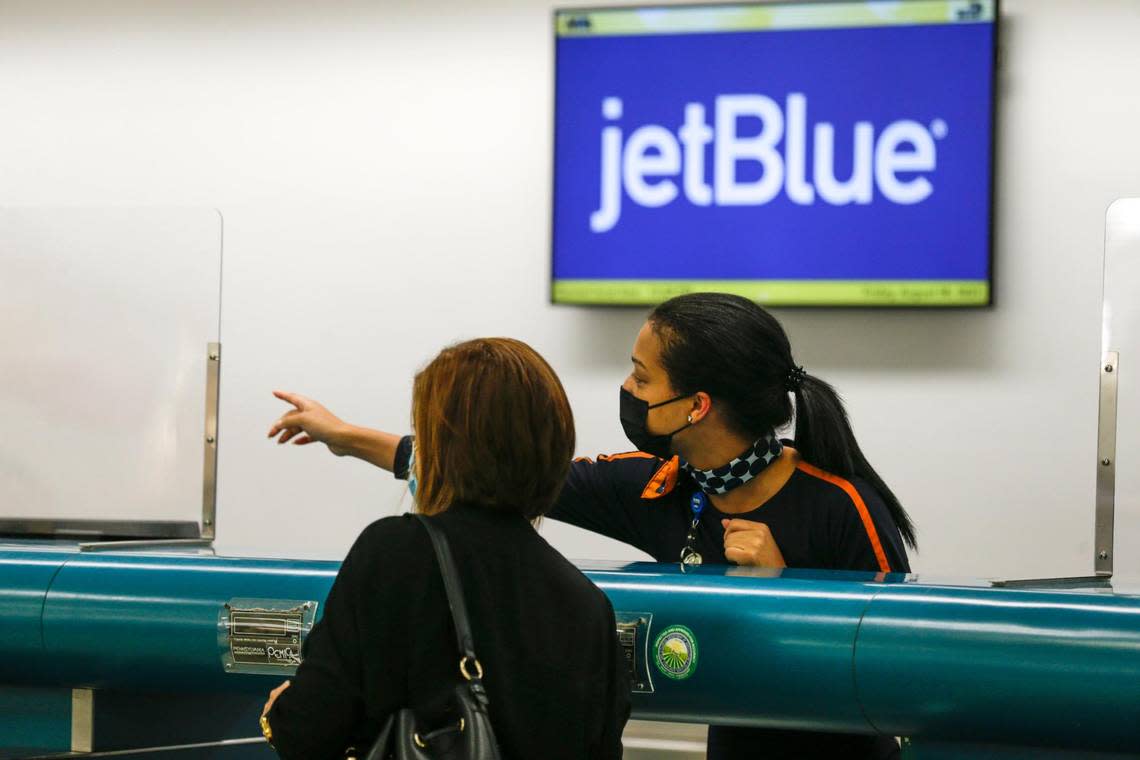Spirit and Frontier abort planned merger, leaving Broward airline’s future up in the air
Spirit Airlines’ shareholders on Wednesday rejected a planned merger with Frontier Airlines, after a monthslong bidding war between Frontier and JetBlue Airways, creating uncertainty about the future of the Broward County-based airline.
Spirit CEO Ted Christie said in a statement he was “disappointed” to terminate talks toward the proposed combination with Denver-based Frontier, but said Spirit would continue discussions with New York-based JetBlue over its unsolicited $3.7 billion cash offer. That’s roughly $1 billion greater than Frontier’s cash-and-stock bid.
“Moving forward, the Spirit Board of Directors will continue our ongoing discussions with JetBlue as we pursue the best path forward for Spirit and our stockholders,” said Christie, even though he’d previously said Spirit would keep flying solo if its shareholders rejected Frontier’s merger offer.
If Spirit and JetBlue executives and directors agree on terms of a sale of the South Florida airline to JetBlue, federal regulators would then review the deal and it could take a couple of years before they render a final decision.
As investor support faded for Spirit and Frontier to form a national discount airline, Frontier CEO Barry Biffle told Spirit’s leadership earlier this month the airline had made its, “last, best and final offer.”
“It’s dead,” said Henry Harteveldt, a travel industry analyst at Atmosphere Research Group based in San Francisco, of Spirit and Frontier trying to close a merger deal Spirit’s stockholders would approve. “It’s a very bitter breakup and Frontier is moving on.”
The stakes are high for Miramar-based Spirit, which employs 3,400 people in South Florida and is the leading airline by market share at Fort Lauderdale-Hollywood International Airport. Choosing Frontier or JetBlue as a partner would create the fifth largest U.S. airline, giving it enough market share to compete with the nation’s biggest legacy airlines like American Airlines, Delta, Southwest and United.
Now, after investors didn’t show sufficient support for the planned deal with Frontier, “Spirit leadership cannot stand in the way of a bona fide proposal from JetBlue,” Harteveldt said. “If you have JetBlue extending an all-cash offer for Spirit stock in the current business environment, where economic uncertainty grows by the day, I think institutional shareholders will look at that and say that one bird in the hand is worth two in the bush.”
Frontier’s final offer landed at $4.13 per share of Spirit stock, a $2 increase for the cash portion from its original February offer, along with a $350 million termination fee, up from $250 million, if Spirit’s shareholders had approved the transaction but the airlines couldn’t get federal regulators to go along with it.
JetBlue adjusted its final offer in late June, upping its bid to an equivalent of $34.14 per share with a $400 million termination fee, if federal regulators wouldn’t eventually clear its acquisition of Spirit.
The Spirit shareholders’ vote, which was delayed by the airline four times to try and muster more support for a tie-up with Frontier before taking place on Wednesday, only gave stockholders the opportunity to reject or approve the planned merger with Frontier.
In April, JetBlue flew into the picture with its lucrative all-cash offer aimed at thwarting a merger between the two discount airlines. During the bidding war, Frontier and JetBlue sweetened their bids, but Spirit’s management and board of directors consistently favored the Frontier transaction. Spirit officials worried that federal regulators wouldn’t ever approve a sale to JetBlue because there’s significant overlap in the East Coast service areas of the two airlines and concerns that such a deal would drive up airfares.
“What is JetBlue’s motivation in all this?” Spirit’s Christie said in a call with airline industry analysts in late May. “I believe it is a cynical attempt to disrupt our merger with Frontier, because a Spirit-Frontier combination poses a competitive threat. ... My message to Spirit stockholders is, don’t be distracted by JetBlue’s tender offer.”
Airline industry experts said Wednesday a confluence of factors led to an attempted Spirit-Frontier merger crashing. Volatility in the airline sector, high fuel costs, persistent staffing challenges and the volatile U.S. economy were the key elements, they said. Also, Influential proxy firm Institutional Shareholder Services, said in the end that JetBlue’s more generous cash offer was a safer bet for investors. The firm had swung back and forth favoring Spirit combining with Frontier and JetBlue at different points, before finally on July 15 urging Spirit’s shareholders to reject Frontier’s offer.
Glass Lewis, another prominent investor advisory firm, recommended Spirit’s stockholders approve a Frontier merger.
The Association of Flight Attendants, which represents Spirit and Frontier flight attendants, said in a statement Wednesday: “The shareholders have spoken. Our union remains focused on negotiating to improve the lives of flight attendants at Spirit and Frontier.”
Meanwhile, Spirit continues building a new headquarters campus in Dania Beach, closer to Fort Lauderdale airport. The 300,000-square-foot corporate office will include a training center, assembly space and amenities for employees such as a parking garage. Spirit said the project it announced in 2019 is active and ongoing.








